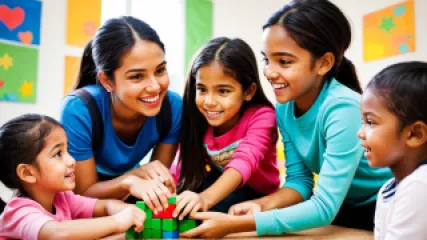The Power of Nurturing Resilience in Childhood
Childhood is a time of growth, exploration, and learning. It is also a time when children face various challenges that can shape their character and resilience. Resilience, the ability to bounce back from adversity, is a crucial skill that helps children navigate life's ups and downs. As parents, caregivers, and educators, it is our responsibility to nurture and strengthen resilience in children. In this opinion piece, we will explore the power of nurturing resilience in childhood and why it is essential for the well-being and success of our children.
The Importance of Resilience in Childhood
Resilience is more than just the ability to endure difficult situations; it is the capacity to learn, adapt, and grow from them. Children who develop resilience are better equipped to handle stress, setbacks, and challenges, both in childhood and throughout their lives. They are more likely to have positive mental health, develop healthy coping mechanisms, and build strong relationships.
Resilience acts as a protective factor, buffering against the negative effects of adversity. It helps children develop a sense of self-efficacy, confidence, and perseverance. When children face obstacles and overcome them, they gain a sense of accomplishment and build resilience muscles that will serve them well in the future.
The Role of Parents, Caregivers, and Educators
Parents, caregivers, and educators play a vital role in nurturing and strengthening resilience in children. By creating a supportive and nurturing environment, we can provide children with the tools and skills they need to develop resilience.
One of the most important ways to nurture resilience in children is by fostering strong, secure attachments. When children feel loved, supported, and valued, they are more likely to develop a sense of security and self-worth. This serves as a foundation for resilience, allowing children to face challenges with confidence and seek support when needed.
Additionally, parents, caregivers, and educators can encourage problem-solving skills by allowing children to make decisions, take risks, and learn from their mistakes. When children are given the opportunity to solve problems on their own, they develop critical thinking skills, independence, and resilience.
Building Resilience Skills
Resilience is not a fixed trait; it can be developed and strengthened over time. There are several key skills that can help children build resilience:
- Emotional Regulation: Teaching children how to identify and manage their emotions is essential for building resilience. By helping children understand and express their feelings in healthy ways, we equip them with important tools to navigate challenging situations.
- Positive Thinking: Encouraging a positive mindset can help children reframe challenges as opportunities for growth. By teaching children to focus on their strengths and cultivate optimism, we empower them to approach adversity with resilience and determination.
- Problem-Solving: Teaching children problem-solving skills helps them develop a proactive approach to challenges. By breaking down problems into manageable steps and brainstorming solutions, children learn to tackle obstacles head-on and build resilience in the process.
- Self-Care: Instilling healthy self-care habits in children is crucial for building resilience. Teaching them the importance of physical exercise, nutrition, rest, and relaxation helps them develop the resilience they need to thrive.
- Social Support: Building strong social connections is essential for resilience. Encouraging children to cultivate meaningful relationships, seek support from trusted individuals, and engage in supportive communities helps them build a network of resources that can aid them in challenging times.
The Power of Nurturing Resilience
Nurturing resilience in childhood has profound and long-lasting effects on a child's well-being and success. It equips children with the tools and skills they need to navigate life's challenges, develop healthy coping mechanisms, and thrive in an ever-changing world.
Resilient children are more likely to excel academically, have better mental health outcomes, and develop stronger interpersonal skills. They are better prepared to handle stress, setbacks, and adversity, and are more likely to achieve their goals and aspirations.
Moreover, nurturing resilience in childhood contributes to building a more resilient society. When we invest in the resilience of our children, we are investing in the future. Resilient individuals are better equipped to contribute positively to their communities, overcome societal challenges, and create a brighter tomorrow for all.
Conclusion
Nurturing resilience in childhood is a powerful investment in the well-being and future success of our children. By creating a supportive and nurturing environment, fostering secure attachments, and teaching essential resilience skills, we can empower our children to thrive in the face of adversity.
As parents, caregivers, and educators, we have the privilege and responsibility to shape the resilience of the next generation. Let us embrace this role wholeheartedly and commit to nurturing resilience in childhood, for it holds the power to transform lives and create a more resilient and compassionate world.






